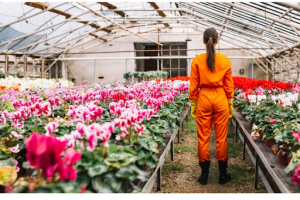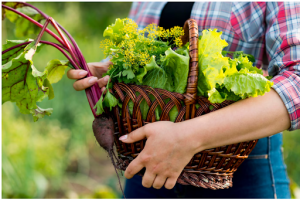What is Agriculture?
Agriculture is the practice of cultivating soil, growing crops, and raising animals for food, fiber, and other products used to sustain and enhance human life. It plays a crucial role in the economy and is foundational to food security and nutrition.
Exam:
- Growing Crops:such as wheat, rice, and corn.
- Gardening:like tomatoes, lettuce, and basil.
- Processed Foods:For instance, cereals, snacks, and frozen meals contain grains and other ingredients sourced from farms.
Benefits and Harms of Agriculture
Benefits of Agriculture
Food Production: Agriculture provides the food we eat, including fruits, vegetables, grains, and meat. It helps ensure that people have enough to eat.
Economic Growth: Farming contributes to the economy by creating jobs and supporting local businesses. It helps communities thrive by providing income for farmers and workers.
Raw Materials: Agriculture supplies raw materials for many industries, such as textiles (cotton), construction (wood), and biofuels (corn, soy).
Biodiversity: Sustainable farming practices can help preserve different plant and animal species. Crop rotation and organic farming promote a healthier ecosystem.
Rural Development: Agriculture supports rural communities by providing employment and improving infrastructure, such as roads and schools.
Harms of Agriculture
Environmental Impact: Intensive farming can lead to soil degradation, deforestation, and loss of biodiversity. Pesticides and fertilizers can pollute water sources and harm wildlife.
Climate Change: Agriculture contributes to greenhouse gas emissions through livestock production and the use of fossil fuels in farming equipment. This can worsen climate change.
Resource Depletion: Farming requires significant amounts of water, which can lead to water scarcity, especially in areas prone to drought.
Health Risks: The use of chemicals in agriculture can pose health risks to farmworkers and consumers. Pesticides and herbicides may remain on food and affect human health.
Market Volatility: Farmers can face unpredictable prices for their products due to market fluctuations, making it difficult to sustain a stable income.
What is Horticulture?

Horticulture is a branch of agriculture that focuses on the cultivation of plants for food, ornamental purposes, and environmental sustainability. It involves growing fruits, vegetables, nuts, seeds, herbs, sprouts, mushrooms, algae, flowers, seaweeds, and non-food crops such as grass and ornamental trees and plants.
Exam:
Home Gardening: Like tomatoes, peppers, and lettuce, as well as herbs like basil and cilantro.
Flower Gardening: such as roses, tulips, and marigolds, are commonly grown in gardens and yards.
Fruit Orchards: such as apple orchards or berry farms, is a form of horticulture.
Benefits and Harms of Horticulture
Benefits of Horticulture
Fresh Produce: Horticulture provides access to fresh fruits and vegetables, promoting healthy eating and nutrition.
Cost Savings: Growing your own food can save money and reduce reliance on packaged products.
Aesthetic Improvement: Colorful gardens and landscaping enhance the beauty of homes and communities, improving mental well-being.
Economic Support: Horticulture creates jobs in gardening, landscaping, and nurseries, supporting local economies.
Harms of Horticulture
Chemical Use: The use of pesticides and fertilizers can harm the environment and pose health risks if misused.
Soil Degradation: Intensive practices can lead to soil degradation and loss of fertility.
Water Depletion: Overuse of water resources can occur, especially in regions where water is scarce.
Invasive Species: Some ornamental plants may become invasive, outcompeting local species and disrupting ecosystems.
Monoculture Risks: Commercial horticulture may promote monoculture, reducing biodiversity and making crops more vulnerable to pests and diseases.
Agriculture vs. Horticulture and Permaculture

Agriculture is the broad practice of growing crops and raising animals for food, fiber, and other products. It includes various farming techniques and can involve large-scale operations, such as wheat farms or livestock ranches. The primary goal of agriculture is to produce food and raw materials to support human needs. In contrast, horticulture is a specific branch of agriculture that focuses on growing plants for food, ornamental purposes, and landscaping.
Meanwhile, permaculture is a design philosophy that combines agriculture and horticulture with ecological principles, creating sustainable and self-sufficient systems. It emphasizes working with nature to promote biodiversity, minimize waste, and conserve resources, integrating gardens, forests, and livestock to support both people and the environment. In summary, while agriculture encompasses all farming practices, horticulture zeroes in on plant cultivation, and permaculture advocates for sustainable, ecological approaches to gardening and farming.
horticulture vs agriculture degree
A degree in agriculture focuses on the overall study of farming, including growing crops and raising animals. Students learn about agricultural science, farm management, soil health, and agricultural economics. The program covers various farming practices and aims to improve food production and sustainability. Graduates can work in diverse areas, such as farm management, agricultural research, and food policy, often dealing with larger agricultural systems.
In contrast, a degree in horticulture specifically centers on cultivating plants, including fruits, vegetables, flowers, and ornamental plants. This program emphasizes plant biology, soil management, pest control, and landscape design. Students learn about gardening techniques, greenhouse management, and sustainable practices related to plant care. Graduates can pursue careers in landscaping, nursery management, and plant research, focusing on the science and art of growing and maintaining plants. In summary, while an agriculture degree provides a broad understanding of farming and food production, a horticulture degree focuses on the specialized study of plants.
Importance of horticulture in economy
Horticulture plays a vital role in the economy by providing fresh fruits, vegetables, and flowers that are essential for healthy diets. This demand creates jobs for farmers, gardeners, and workers in nurseries and greenhouses. Local economies benefit as small businesses, such as farmers’ markets and landscaping services, thrive on the production of locally grown products, keeping money within the community.
Additionally, horticulture enhances property values by beautifying neighborhoods and public spaces, attracting tourists and new residents. It also promotes biodiversity, which is essential for maintaining healthy ecosystems and ensuring food security. Overall, horticulture contributes significantly to job creation, local business support, and community well-being, making it a crucial component of a strong economy.
FAQ
- What is the difference between agriculture and horticulture?
Agriculture is the broad practice of growing crops and raising animals for food and other products, while horticulture specifically focuses on the cultivation of plants, including fruits, vegetables, and ornamental plants. - What can I do with a degree in agriculture?
Graduates with a degree in agriculture can pursue careers in farm management, agricultural research, food policy, and agribusiness, among other fields. - What are the career options for horticulture graduates?
Horticulture graduates can work in landscaping, nursery management, plant research, and garden design, focusing on the cultivation and care of plants. - Is horticulture a part of agriculture?
Yes, horticulture is a specialized branch of agriculture that deals specifically with growing plants for food, decoration, and landscaping.
Conclusion
In conclusion, both agriculture and horticulture play vital roles in our food systems and the environment. A degree in agriculture offers a broad understanding of farming practices, focusing on the production of crops and livestock on a larger scale. This knowledge equips graduates to address food security and sustainability challenges.
On the other hand, a degree in horticulture specializes in the cultivation and care of plants, emphasizing gardening, landscaping, and sustainable practices. Graduates of horticulture contribute to beautifying spaces, improving nutrition, and enhancing biodiversity. Together, these fields complement each other, supporting not only the economy but also our connection to nature and healthy living.

